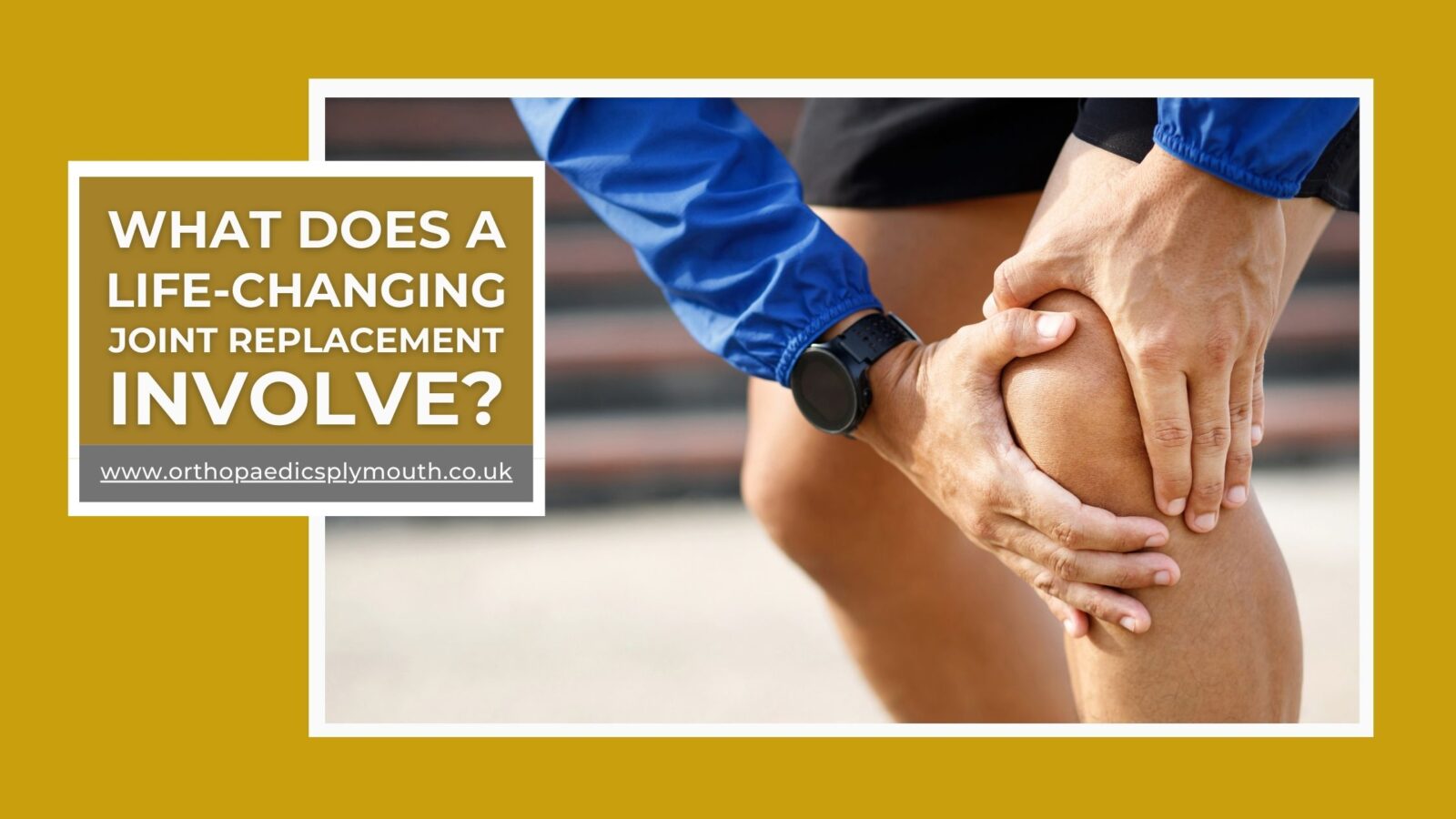Is knee or hip joint replacement my only option?
Joint replacement is not always the only option for addressing knee or hip pain.
Contents
ToggleThere are various conservative treatments and interventions available depending on the severity of the condition including medication, physiotherapy, lifestyle modifications, injections, and alternative therapies such as acupuncture. These approaches aim to alleviate pain, improve joint function, and delay the need for surgery.
However, in cases where conservative treatments fail to provide sufficient relief or when joint damage is severe, joint replacement surgery may be recommended by Mr Stitson.
What joint replacement involves
Joint replacement involves removing the damaged parts of the joint and replacing them with artificial components made of metal, plastic or ceramic. Joint replacement aims to reduce pain significantly and to improve mobility and function.
Joint pain can affect the body in several ways:
1. Mobility: Joint pain can restrict movement and make it difficult to perform daily activities such as walking, climbing stairs or even standing for extended periods.
2. Muscle Weakness: Chronic joint pain can lead to muscle weakness and atrophy (wasting). This happens because the individual is unable to or avoids using the affected joint because of pain.
3. Decreased Quality of Life: Joint pain can impact your overall quality of life by interfering with work, hobbies, social activities and even simple tasks such as dressing or bathing.
4. Mental Health: Constant pain and limited mobility can contribute to feelings of frustration, anxiety, depression and social isolation.
For patients over 50 (and sometimes younger), knee pain and hip pain can have a significant impact on quality of life:
1. Limitations in Mobility: Knee and hip pain can severely restrict mobility, making it challenging to engage in physical activities, maintain independence or perform routine tasks.
2. Decreased Social Engagement: Pain and mobility issues may lead to social withdrawal and isolation, due to avoidance of activities involving walking or standing for extended periods.
3. Disruption of Daily Activities: Joint pain can interfere with daily activities such as going to work, household chores, shopping and recreational pursuits. This also can lead to frustration and decreased satisfaction with life.
4. Sleep Disturbances: Pain can disrupt sleep patterns, leading to fatigue and exacerbating other health issues.
5. Reduced Emotional Well-being: Chronic pain can also take its toll on your mental health and lead to increased stress, anxiety and depression.
Knee and hip pain can significantly impair the quality of life and not just for patients over 50. This highlights the importance of early investigation and appropriate intervention to address these issues effectively. Mr Stitson offers a full range of hip replacement and knee replacement options, including partial knee replacement, total knee replacement, revision knee replacement, total hip replacement and revision hip replacement. Custom-made hip and knee solutions are also available when indicated.
Mr Stitson also offers and a variety of general orthopaedic procedures including knee arthroscopy and operations for trauma including fractures.
“Mr Stitson will use his extensive experience to diagnose and provide treatment options tailored to your specific needs.
Benefits of early intervention for knee and hip pain
Early intervention for knee and hip pain offers several benefits for individuals experiencing symptoms:
- Prevents Progression: Addressing knee and hip pain early can help prevent further damage to the joints. Early intervention may slow down or halt the progression of conditions such as osteoarthritis, reducing the likelihood of more severe symptoms and complications in the future.
- Reduces Pain and Discomfort: Prompt treatment can alleviate pain and discomfort associated with knee and hip issues. By addressing the underlying causes of pain early on, individuals can experience relief and improve their overall quality of life.
- Improves Mobility: Early intervention strategies such as physiotherapy, exercise and lifestyle modifications can help improve joint function and mobility. By maintaining or restoring range of motion and strength, individuals can continue to perform daily activities and maintain independence.
- Minimises Disability: Effective management of knee and hip pain can help prevent or minimise disability. By optimising joint function and mobility, individuals can reduce the impact of pain on their ability to work, engage in recreational activities, and perform essential tasks.
- Enhances Quality of Life: Early intervention can significantly enhance the quality of life for individuals with knee and hip pain. By reducing pain, improving mobility, and preserving function, individuals can enjoy a higher level of physical activity, social engagement and overall well-being.
- Avoids Surgery: In some cases, early intervention may help individuals avoid the need for invasive procedures such as joint replacement surgery. By addressing pain and dysfunction through conservative treatments, individuals may be able to manage their symptoms effectively without undergoing surgery.
- Promotes Long-Term Joint Health: Early intervention strategies such as exercise, weight management, and proper biomechanics can promote long-term joint health. By adopting healthy lifestyle habits and addressing risk factors for joint problems, individuals can reduce the likelihood of future knee and hip issues.
“Maximise outcomes, minimise disability and improve your overall quality of life with early intervention for knee and hip pain.
Early intervention allows for timely management of knee or hip pain, preservation of joint function, and prevention of further deterioration, ultimately promoting better long-term joint health and well-being. Mr Stitson can provide advice on the best course of action for managing your joint paint.
About Knee Surgery
Knee replacement surgery replaces the worn out, painful and stiff knee joint with a new prosthetic joint. This procedure which may be a partial or a total replacement is normally performed under spinal anaesthesia and is usually followed by a night or two in the hospital. Day-case knee replacement surgery may be an appropriate option for you.
About Hip Surgery
Total hip replacement surgery replaces the worn-out painful and stiff hip joint with a new prosthetic joint. This procedure is normally performed under spinal anaesthesia and is commonly followed by a night or two in the hospital. Day-case hip replacement surgery may be an appropriate option for you.

About Mr Stitson
David Stitson is a Plymouth-based Consultant Trauma and Orthopaedic Surgeon. Trained both in the UK and internationally, he has worked in medicine for more than 20 years for the NHS, for the Royal Air Force and in private practice. Mr Stitson operates privately at the Nuffield Health Hospital, Plymouth.

The Nuffield Plymouth CQC Rating
The Nuffield Hospital has a history that spans over half a century and has built a reputation for high standards of care, professionalism and expertise in delivering health services. They aim for continuous quality improvement in everything they do.
Active Quality and Governance programmes are in place at the Nuffield Hospital Plymouth. As part of this, the hospital is inspected by independent healthcare regulators to ensure it meets the fundamental standards of quality and safety as determined by the regulating body (CQC).
In the most recent inspection, Plymouth Nuffield Hospital was rated as ‘Good’ overall, however, the surgical element of the inspection was rated as ‘Outstanding’. The hospital was referred to as:
“Outstanding in effective and caring, and
Good in safe, responsive and well-led.”




